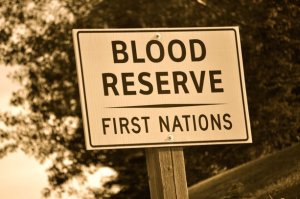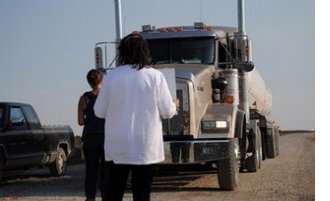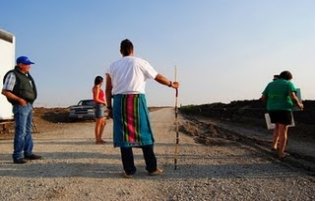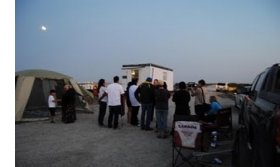–by Anne Petermann, Executive Director, Global Justice Ecology Project; North American Focal Point, Global Forest Coalition
… the Indonesian military is getting money through climate financing for REDD-type projects. The communities that live in the forests–some of them Indigenous to the area, some of them relocated there in the 80s–are being invaded by heavily armed forest rangers, paramilitaries and police; and are forced to leave at gunpoint while their homes are burned to the ground.

Benoit Bosquet, Coordinator of the World Bank's Forest Carbon Partnership Facility, defends the bank's role in "forest conservation" in Indonesia, where forest-based communities have been forcibly evicted at gunpoint. Behind him is a photo of one such eviction. Photo: Petermann/GJEP
Today commenced the fall meetings of the World Bank in Washington, DC. The Bank has long been known for its strong-arm tactics to force countries in the Global South to turn over their resources–whether natural resources or poor peoples’ labor– to corporations based in the Industrialized North.
While the Bank is notorious as a major funder of fossil fuel projects, devastating large-scale hydroelectric projects and deforestation projects, they have now become one of the leaders in the effort to use “market-based” schemes for climate mitigation. They are the world’s carbon brokers.
Indeed, one of the items on their meeting agenda is climate finance–pumping money into various developing countries to supposedly undertake climate mitigation programs that will predominately benefit countries in the north, by enabling them to maintain business as usual and avoid cutting greenhouse gas emissions.
Appropriately, there was a civil society session this morning on the impacts of climate finance for REDD projects in Indonesia. Indonesia is a global focal point for climate action because of the massive climate emissions that have occurred there largely as a result of the burning of primeval peat forests for conversion to oil palm plantations. But even the climate mitigation programs come with a high price, and Indonesia provides a stark case study of the devastating social and ecological impacts of REDD (the scheme to Reduce Emissions from Deforestation and Forest Degradation).
But in order to participate in the workshop, it was first necessary to navigate the World Bank’s ridiculous security process.
It became obvious quickly that the Bank is quite paranoid about security. Now why, I wondered sarcastically, would an institution whose mission is ostensibly about poverty eradication need blocks and blocks of metal barricades and legions of police surrounding it?
Perhaps it has something to do with all of the people around the globe who have suffered under their severely unjust policies. Maybe they never quite got over A-16, (April 16, 2000) when thousands of activists descended on DC to blockade all of the streets surrounding the World Bank in a massive condemnation of the Bank’s dirty dealings.
But on this day, there were no protests, yet I still got the run-around by numerous unfriendly security officers and police, directed this way and that until I finally managed to find the registration building.
Once there, I explained for the fourth time that I was only there for one workshop and just needed a day pass. “We’re not giving out day passes today,” the desk jockey muttered. I had not encountered such surly, robot-like people since the Manchester, New Hampshire jail after a group of us were arrested in January 2000 for occupying Al Gore’s NH campaign headquarters in support of the U’Wa people of Colombia, whose lands were threatened by oil drilling by Occidental Petroleum. (Al had a lot of stock in Occidental).
Frustrated, irritated and thoroughly disgusted, I was ready to give up and make the trek back uptown when I saw a separate registration area for CSOs (civil society organizations). Okay, I thought, one more try.
I won’t go into the details, but suffice it to say, I talked my way into an official access badge. Then after navigating yet more metal barricades, police officers and a metal detector, I finally arrived at my destination: the workshop on the impacts of REDD and forest “conservation” in Indonesia. It was horrifying.
Global Justice Ecology Project has been exposing the impacts of REDD on communities in Chiapas, Mexico and California as the result of a sub-national REDD carbon offset deal between the two states. Indigenous communities in the jungle of Chiapas are threatened with displacement for “forest protection” projects, and being subjected to intimidation tactics such as the withholding of medical services to try to force them to leave.
But what is happening on the ground in Indonesia is even more extreme. As one panelist pointed out, the violence happening to the people in the forests is even worse than the violence that occurred under the Suharto dictatorship.
While the dictatorship no longer exists, the military still maintains most of the power in the country–and now that the forests have suddenly increased in value because of REDD (because the carbon stored by the trees now has value), people who live in the forests but do not have official title to their lands (which is about 80% of the people in the rural areas) are being violently evicted for “conservation” projects.
In the 1980s, a program was initiated in Indonesia called the Transmigration Program. It moved 2.5 million people off of the heavily populated islands of Bali and Java and onto other islands, leading to tremendous land conflicts. In some areas, the ratio of migrants to locals was 2:1. This, the speaker explained, is exactly what is now happening under REDD. Massive population displacement.
In a nutshell, the Indonesian military is getting money through climate financing for REDD-type projects. The communities that live in the forests–some of them Indigenous to the area, some of them relocated there in the 80s–are being invaded by heavily armed forest rangers, paramilitaries and police; and are forced to leave at gunpoint while their homes are burned to the ground.
All in the name of conservation.
I spoke briefly with the panel moderator, a woman native to Indonesia, about our work in Chiapas and what we had found there.
“Yes,” she replied. “What we see in Indonesia is not unique. It is happening all over with these REDD projects.”
And what is the point of all of this suffering and misery and violence? To provide corporations in the industrialized north with the opportunity to avoid reducing their pollution by “buying” carbon stored in some distant forest thereby “offsetting” their emissions.
So, in other words, impoverished rural and Indigenous peoples are being confronted with unspeakable violence to allow companies in the North to continue to poison and pollute poor communities near their facilities in the North.
Benoit Bosque, of the World Bank’s Forest Carbon Partnership Facility (the Bank’s program to help design and fund REDD projects in tropical and subtropical countries) spoke and tried to deflect this intense critique by explaining that REDD was extremely complex, but we shouldn’t give up. “These conflicts are about an accumulation of past mistakes. We cannot let fear of mistakes prevent us from taking bold steps forward.”
Yeah, tell that to the Indigenous Peoples being thrown off of their ancestral lands…
His callous reply received a lot of indignant responses from both the audience and the panel, who pointed out that the World Bank’s track record of enforcing even its own safeguards is terrible. “Consultations have been window dressing. Demands must be made for accountability with World Bank partners or don‘t make them partners. Don’t give them funding!”
At that Benoit bid his adieu before there were any more confrontations about the Bank’s role in funding violence against forest dependent communities.
For these reasons and many, many more, organizations and Indigenous Peoples’ groups around the world are condemning REDD. For more information on this, go to: http://noredd.makenoise.org/. To learn more about GJEP’s work in Chiapas and California on REDD, go to http://climate-connections.org/category/chiapas-2/. To view our photo essay from the community of Amador Hernandez in the Lacandon Jungle, click here
 Global Justice Ecology Project partners with the Sojourner Truth show on KPFK Pacifica Los Angeles for a weekly segment on the environment.
Global Justice Ecology Project partners with the Sojourner Truth show on KPFK Pacifica Los Angeles for a weekly segment on the environment.



 Early [September 9, 2011] numerous women from the Blood Nation have courageously parked in front of Murphy Oil’s fracking development site vowing not to move until plans of fracking for oil and gas are stopped. The women are part of the Kainai Earth Watch and have been active advocates to stop the fracking due to the major threat to human health, wildlife and livestock and the irreversible damage to the land and water on the Blood Reserve and surrounding areas. They feel this is the only choice left to them to stop the operations as plans for construction begin tomorrow [September 10, 2011].
Early [September 9, 2011] numerous women from the Blood Nation have courageously parked in front of Murphy Oil’s fracking development site vowing not to move until plans of fracking for oil and gas are stopped. The women are part of the Kainai Earth Watch and have been active advocates to stop the fracking due to the major threat to human health, wildlife and livestock and the irreversible damage to the land and water on the Blood Reserve and surrounding areas. They feel this is the only choice left to them to stop the operations as plans for construction begin tomorrow [September 10, 2011]. Since that time local residents of the Blood Nation and surrounding communities have come together to oppose the projects. Members of the KaiNai Earth Watch have partnered with numerous community groups, including the Lethbridge Council of Canadians, to host numerous educational workshops, organize petitions, and meet with government officials. Despite their efforts, nothing has been effective in actually preventing the fracking from going ahead.
Since that time local residents of the Blood Nation and surrounding communities have come together to oppose the projects. Members of the KaiNai Earth Watch have partnered with numerous community groups, including the Lethbridge Council of Canadians, to host numerous educational workshops, organize petitions, and meet with government officials. Despite their efforts, nothing has been effective in actually preventing the fracking from going ahead. The second issue at hand is the nature of the deal between KRI, Murphy Oil, and Bowood Energy. We believe this to be highly problematic for a number of reasons:
The second issue at hand is the nature of the deal between KRI, Murphy Oil, and Bowood Energy. We believe this to be highly problematic for a number of reasons:
